How AI Is Shaping Automated Call Center Operations in 2025
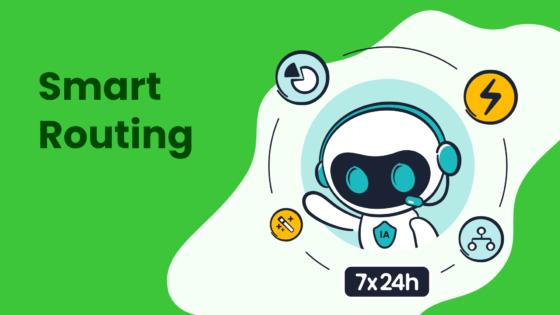
AI transformation is redefining automated call center operations in 2025. Businesses now rely on AI automation to deliver faster, more accurate customer experiences. The global call center AI market continues to grow rapidly, with North America leading adoption. Companies see up to 60% cost reduction, 70% faster call handling, and a 25-40% increase in customer experience.
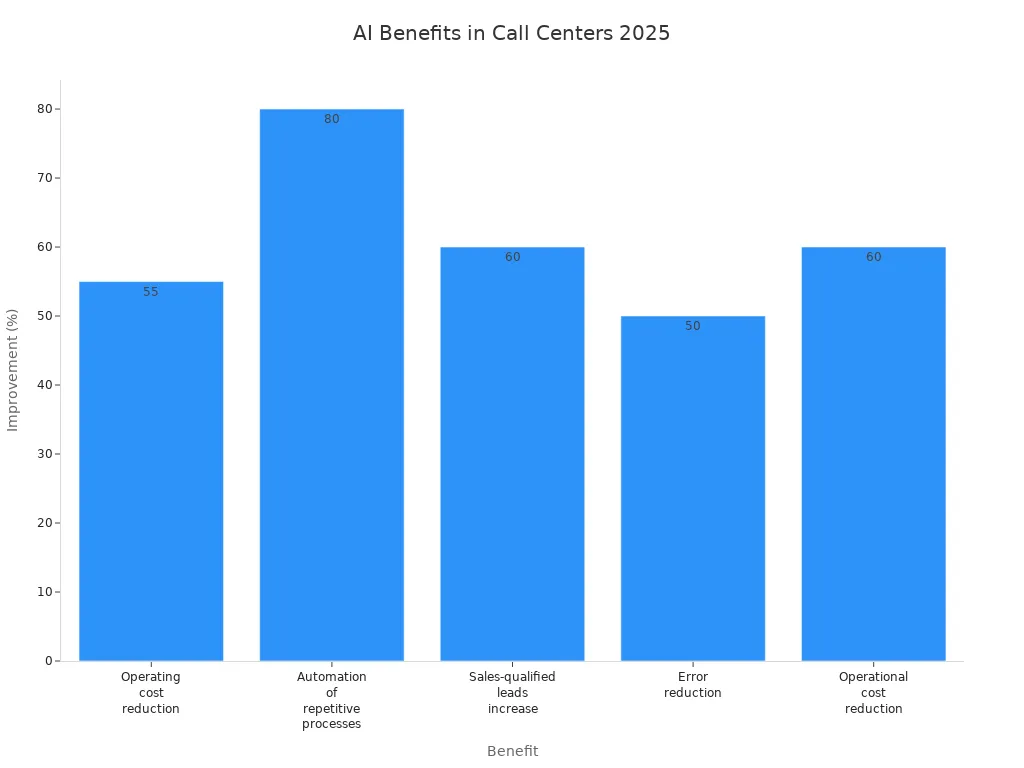
Sobot AI delivers these benefits through advanced automation and seamless integration, while human agents focus on complex customer needs.
AI in Automated Call Centers

AI Automation Defined
Industry experts describe AI automation in automated call centers in 2025 as the seamless integration of advanced artificial intelligence technologies. These include generative AI, conversational AI, speech analytics, and predictive analytics. AI automation enables automated call centers to deliver 24/7 support, handle high volumes of customer inquiries, and provide personalized customer interactions. AI-powered systems automate routine tasks, such as answering common questions or updating account information. This approach improves agent productivity and reduces errors. AI automation also supports real-time agent assistance, quality assurance, and compliance monitoring. Experts emphasize that AI augments human agents, providing guidance and context-aware support while maintaining human oversight. This combination leads to greater operational efficiency and a better customer experience.
Key Technologies
Automated call centers rely on a range of AI technologies to drive automation and efficiency. The most widely used tools include conversational AI, natural language processing (NLP), machine learning, AI-powered chatbots, and virtual assistants. Speech analytics and automation technologies help monitor calls for quality and compliance. AI-driven automation allows for faster response times and cost reductions. These technologies also enable automating routine tasks, such as balance inquiries or ticket upgrades, and support personalized customer interactions by analyzing previous customer data. By 2025, 95% of customer interactions will be AI-powered, and 80% of customer service organizations will use generative AI (Servion Global Solutions).
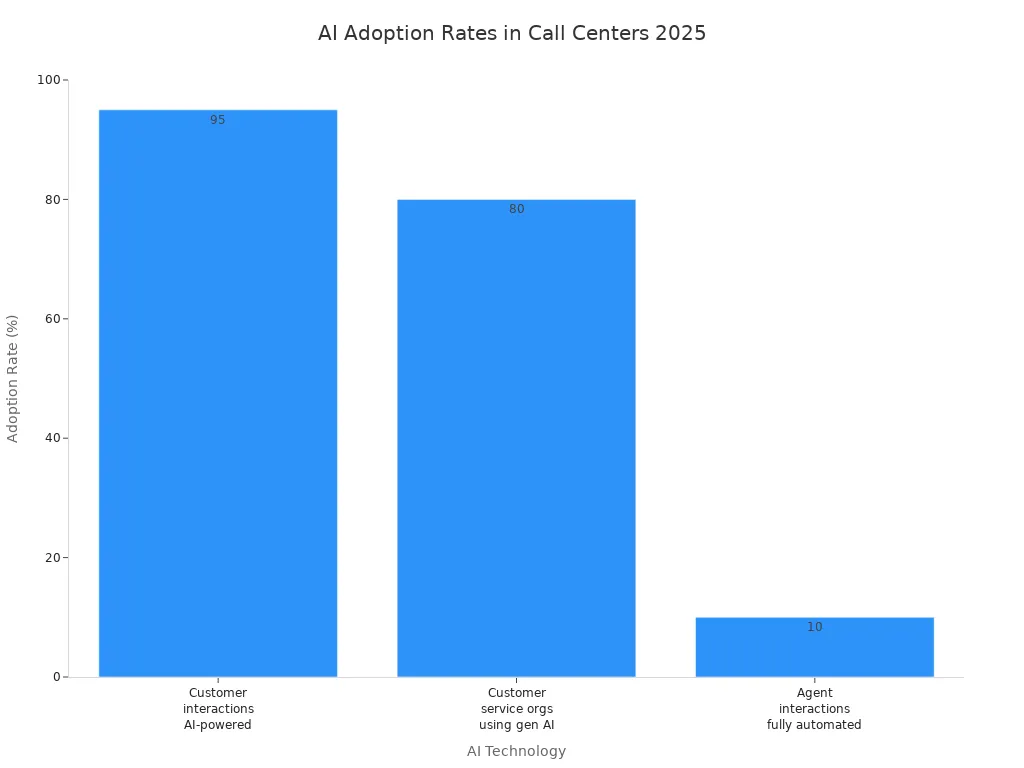
Sobot Voice/Call Center Features
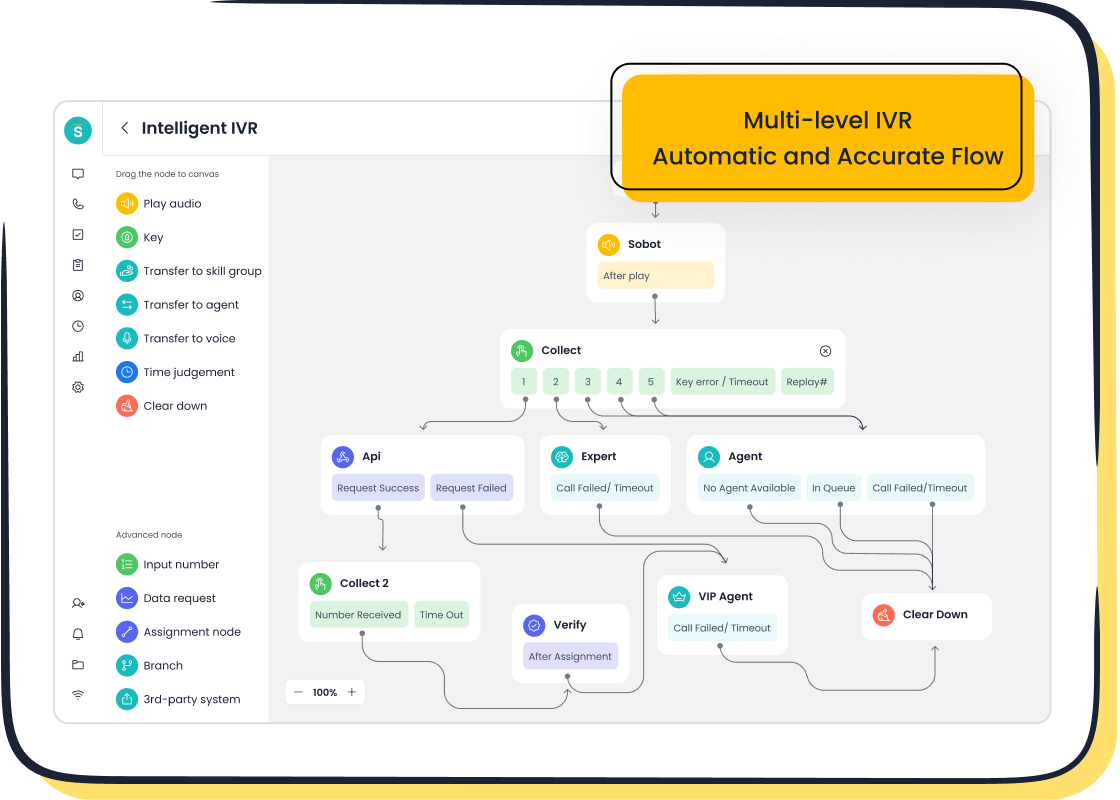
Sobot stands out as a leader in the AI-driven contact center space. Its Voice/Call Center platform integrates artificial intelligence to deliver enhanced efficiency and automation. Key features include intelligent IVR for customized call routing, a unified workspace for agents, and real-time monitoring and analysis. Sobot’s AI-powered systems offer smart call routing, bulk outbound task automation, and global number availability. The platform supports automating routine tasks, advanced data analytics, and secure encrypted data transfer. Sobot’s AI-first contact center approach ensures businesses can scale operations, improve resource optimization, and deliver consistent, high-quality customer service worldwide. Learn more about Sobot’s Voice/Call Center at Sobot Voice.
Impact of AI on Call Center Operations
Efficiency Gains
AI transformation has brought remarkable efficiency gains to the automated call center. Companies now use artificial intelligence to automate routine tasks, which frees agents to focus on complex customer needs. This shift leads to faster response times and improved operational efficiency.
- Omnichannel strategies reduce average handling time by removing repetitive information gathering.
- AI voice agents help a regional insurer cut average handling time from 6 to 3.8 minutes.
- IBM reports a 40% reduction in call center costs after AI voice agent implementation.
- Deloitte clients see payback in under a year and up to 35% cost-to-serve reductions.
- AI eliminates after-call work by automating post-call summaries and CRM logging.
Sobot’s AI-powered systems deliver enhanced efficiency through features like intelligent IVR, smart call routing, and bulk outbound task automation. These tools help businesses handle higher call volumes without increasing staff, leading to significant cost savings and better customer service.
24/7 Support
AI enables call centers to provide continuous 24/7 support. Automated systems do not require breaks or shifts, so customers receive immediate assistance at any time. This always-on support reduces wait times and handles surges in volume efficiently. For example, healthcare innovator CNH Care uses AI to automate call routing and provide proactive support, maintaining a customer satisfaction score of 96%. Businesses using AI support agents report up to a 27% increase in customer satisfaction scores due to faster, more accurate, and personalized responses.
Sobot’s AI-powered chatbot platform supports 24/7 customer service, ensuring that customers across different time zones get help whenever they need it. This constant availability builds trust and improves the overall customer experience.
Personalization
AI-driven personalization has become a key factor in improving customer experience.
- 80% of companies use AI to enhance customer experience.
- AI-powered personalization can increase customer satisfaction by up to 20% and conversion rates by up to 15%.
- 73% of customers expect better personalization as technology advances.
AI technologies like machine learning and natural language processing enable smarter, faster, and more personalized customer interactions. Sobot’s platform analyzes past behaviors and preferences to deliver personalized recommendations and support. OPPO, for example, uses Sobot to deliver personalized offers and support across multiple channels, resulting in a 30% increase in customer satisfaction and a 25% boost in sales.
Analytics and Insights
AI in call centers generates advanced data analytics and actionable insights that drive operational efficiency and resource optimization.
- AI provides real-time and historical data analysis, sentiment analysis, and agent performance metrics.
- Predictive analytics help anticipate customer behaviors and optimize workflows.
- Automated reporting identifies trends and operational risks, supporting proactive decision-making.
Sobot’s AI-powered systems collect and analyze customer feedback from multiple channels. For instance, OPPO used Sobot’s analytics to identify battery life issues in their phones and improve future models. These insights help managers make smarter decisions, improve agent performance, and enhance customer satisfaction.
AI-powered analytics not only improve service quality but also foster a culture of continuous improvement in call center operations.
Human Agents and AI Collaboration

Augmentation, Not Replacement
AI has changed the way call center operations work, but it does not replace human agents. Instead, AI agents and artificial intelligence tools support staff by automating routine tasks and providing real-time insights. This partnership allows human agents to focus on more complex customer issues and strategic problem-solving.
- AI struggles with understanding context, nuance, and emotional cues, which are essential for customer experience.
- AI-powered systems handle repetitive questions, freeing agents to act as advisors.
- The future of the automated call center is a hybrid model, where AI and humans work together, each using their strengths.
- Human agents need to develop new skills to collaborate with AI, reinforcing the idea of augmentation.
- AI enhances operational efficiency but cannot replace the empathy and personal connection that humans provide.
Sobot’s AI-first contact center solutions reflect this hybrid approach. Sobot’s platform uses AI agents to manage high volumes of simple interactions, while human agents handle escalated or sensitive cases.
New Skills for Agents
The rise of AI in call centers means agents need new skills. They must interpret real-time AI-generated data, adjust their responses, and use emotional intelligence to recognize customer needs. Agents now require decision-making agility, deep domain expertise, and consultative sales skills.
- Agents must solve complex problems and predict customer needs using AI-driven insights.
- Relationship-building and adaptive communication are now essential.
- Technology fluency helps agents manage AI tools and workflows.
Sobot provides training and a unified workspace, helping agents develop these skills and deliver better customer service.
Empathy and Complex Issues
AI agents excel at automating routine tasks and providing 24/7 support, but they lack emotional intelligence. Human agents remain vital for handling complex or sensitive customer interactions. Customers prefer speaking with a person when they face stressful or complicated situations.
- Human agents can interpret tone, context, and subtle cues, offering tailored responses.
- AI-driven systems, like Sobot’s smart routing, direct customers to the right agent based on expertise and sentiment analysis.
- Training in soft skills, such as active listening and empathy, improves customer satisfaction.
A hybrid approach, blending AI efficiency with human empathy, leads to higher customer satisfaction and more effective call center operations.
Challenges in AI Call Center Operations
Data Privacy
Data privacy stands as a top concern in every automated call center. Companies must protect sensitive customer information and follow strict regulations. Over half of call centers choose on-premise deployments to keep control over data security. Nearly 70% use encryption protocols to secure voice communications and data exchanges. About 80% comply with GDPR and other privacy laws by using integrated software platforms. AI-powered systems monitor all customer interactions in real time, helping detect policy violations and support compliance. Sobot addresses these challenges with encrypted data transfer and GDPR-compliant solutions, ensuring customer data remains safe. Regular audits, agent training, and advanced authentication methods further strengthen security.
Tip: Always keep compliance checklists updated and invest in continuous training to reduce risks.
AI Bias
AI bias can affect customer experience and decision-making in call center operations. If AI models learn from biased data, they may treat some customers unfairly. Regular audits and transparent AI systems help reduce this risk. In 2025, regulations require companies to review AI for fairness and discrimination. Sobot’s AI-powered systems use high-quality training data and ongoing monitoring to minimize bias. Companies must also explain AI decisions to customers, building trust and transparency.
Integration
Integrating AI into existing call center operations brings several hurdles. Many organizations face high costs and technical challenges when connecting new AI tools with older CRM or call management systems. Common issues include system incompatibility, data management concerns, and resistance from employees.
- Use API-based integration and middleware for smooth data exchange.
- Provide staff training and change management programs.
- Set clear metrics like first contact resolution and customer satisfaction to measure success.
- Protect customer data with encryption and compliance protocols.
Sobot’s platform offers seamless integration with CRM systems, supporting global operations and enhancing efficiency.
Human-AI Balance
Maintaining a balance between AI automation and human agents is vital for customer satisfaction. Research shows that 50% of people view companies less favorably if AI replaces humans. Most customers prefer speaking with a person for phone calls and sensitive issues.
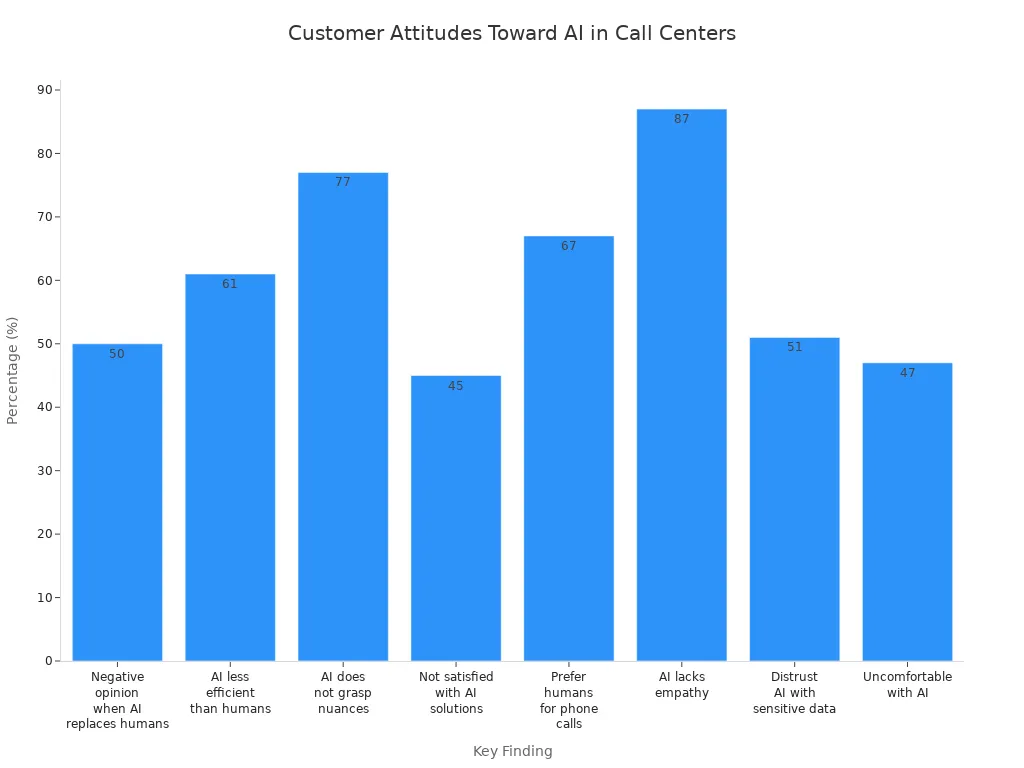
AI-driven automation should handle routine tasks, while human agents focus on complex or emotional interactions. Sobot’s AI-first contact center model ensures seamless escalation from AI agents to humans, preserving empathy and service quality.
Best Practices for AI Operations
Strategic Planning
Successful AI implementation in an automated call center starts with a clear plan. Leaders should follow these steps:
- Assess current call center operations, including call types, volume, and technology.
- Identify areas where AI can add value, such as automating routine tasks or improving customer experience.
- Choose AI technologies that match business needs, focusing on scalability and integration.
- Integrate AI solutions with existing workflows to avoid disruption.
- Train staff to use AI tools and interpret AI-generated insights.
- Monitor performance and focus on continuous optimization.
- Ensure compliance with data privacy and security regulations.
Tip: A phased rollout with clear metrics helps organizations measure the impact of AI and adjust strategies as needed.
Workforce Training
Training remains essential for maximizing the benefits of AI in call centers. Companies should:
- Conduct a skills audit to identify gaps in technical and human skills.
- Create personalized learning paths using AI-powered platforms.
- Blend digital and hands-on training, including simulations and gamified learning.
- Foster a culture of continuous learning with leadership support and peer sharing.
Sobot provides unified workspaces and training resources, helping agents adapt to AI-driven automation and deliver enhanced efficiency.
Choosing Solutions
Organizations should select AI solutions that:
- Automate repetitive tasks and support real-time agent assistance.
- Offer advanced data analytics, sentiment analysis, and quality monitoring.
- Integrate seamlessly across channels like voice, chat, and email.
- Augment human agents, allowing them to focus on complex customer interactions.
Sobot meets these criteria by providing AI-powered systems that automate workflows, support omnichannel integration, and empower agents to deliver personalized customer interactions.
Continuous Improvement
Continuous improvement ensures long-term success in AI-powered call center operations. AI-driven automation enables real-time monitoring, advanced analytics, and proactive quality assurance. Managers can use these insights to refine training, optimize workflows, and boost customer satisfaction. Sobot’s platform supports ongoing feedback and data-driven decision-making, helping organizations maintain high standards and adapt to changing customer needs.
AI continues to reshape automated call center operations, driving better customer experience and operational efficiency. Sobot’s AI-powered systems set the standard for enhanced efficiency and seamless customer interactions. Companies that embrace a hybrid model see clear benefits:
- AI agents handle routine inquiries, freeing human agents for complex issues.
- Intelligent routing reduces wait times and improves customer satisfaction.
- Automation enables 24/7 support and cost savings.
- Human expertise ensures empathy and problem-solving.
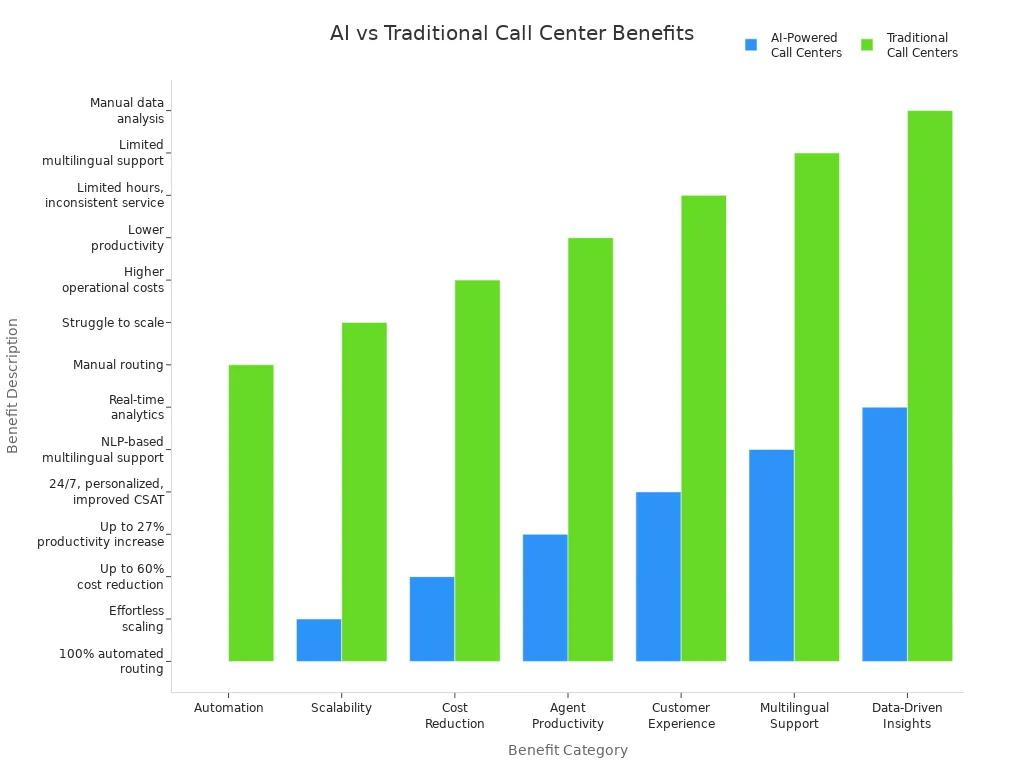
Forward-thinking businesses invest in training and the right AI solutions to deliver outstanding customer experience. The future promises even more personalized customer interactions and continuous improvement in customer service.
FAQ
What is the main impact of AI on automated call center operations?
AI transformation increases operational efficiency by automating routine tasks and reducing wait times. Companies report up to 60% cost reduction and 70% faster call handling. AI-driven automation also improves customer satisfaction and enables 24/7 customer service. Sobot’s AI-powered systems deliver these benefits for global businesses.
How do AI-powered systems personalize customer interactions?
AI in call centers uses advanced data analytics to analyze customer history and preferences. This allows for personalized customer interactions and targeted recommendations. Sobot’s platform helps companies like OPPO increase customer satisfaction and sales by delivering tailored support across multiple channels.
Why do businesses choose an AI-first contact center model?
An AI-first contact center model automates routine tasks and supports agents with real-time insights. This approach leads to enhanced efficiency, resource optimization, and improved customer experience. Sobot’s AI-driven contact center solutions help businesses scale operations and maintain high service quality worldwide.
How does Sobot ensure data privacy and compliance in call center operations?
Sobot uses encrypted data transfer and follows GDPR compliance standards. The platform monitors all customer interactions in real time and supports regular audits. These measures protect sensitive information and help businesses meet strict data privacy regulations in automated call center environments.
What skills do agents need in an AI-driven contact center?
Agents need to interpret AI-generated insights, use technology fluently, and show empathy during complex customer interactions. Sobot provides unified workspaces and training resources, helping agents adapt to AI automation and deliver better customer service and experience.
See Also
Evaluating Artificial Intelligence Solutions For Enterprise Call Centers
Comprehensive Guide To AI Software For Call Centers
Understanding The Efficiency Of Call Center Automation
